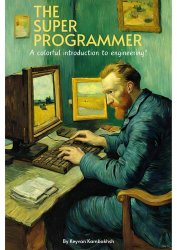The Super Programmer: A colorful introduction to engineering!
- Добавил: literator
- Дата: 25-04-2024, 07:46
- Комментариев: 0
 Название: The Super Programmer: A colorful introduction to engineering! (Updated)
Название: The Super Programmer: A colorful introduction to engineering! (Updated)Автор: Keyvan Kambakhsh
Издательство: Leanpub
Год: 2024-04-11
Страниц: 183
Язык: английский
Формат: pdf (true), epub
Размер: 10.1 MB
This book is for curious people who are eager to learn some of the most fundamental topics of computer and software engineering. The topics presented in this books, although very interesting in author's opinion, are some of the most underrated and least discussed fields of computer programming. This book is about the old technology, the technology we are using everyday, but we refuse to learn and extend as an average engineer. The literature around each of those topics is so large that, only specialists will ever be motivated to learn them.
The Super Programmer is for the programmers who don’t want to limit their knowledge and skills on a very narrow area of software engineering. The Super Programmer is for programmers who can’t sleep at night when they don’t exactly understand how something in their computer works.
The Super Programmer is all about ideas, and how they have evolved through time, leading to the impressive technology we have today. I wanted this book to have least dependency to technologies, so that the codes do not get obsolete over time. I first thought of writing the codes in some pseudo-coding language, but I personally believe that pseudo-codes are not coherent enough, so I decided to choose and stick with a popular language like Python, which as of today, is a programming language that is known by many other engineers and scientists.
The book is divided into 5 chapters. We will start by explaining the beauty of cause-and-effect chains, and how we can build useful and interesting structures by connecting simple lego pieces together. We will go through the history of transistors, how they work, and how we can simulate them using plain Python code. We will implement different logic gates by connecting transistors together, and will proceed to building more complicated circuits like adders, counters and finally, programmable computers. After building our super simple computer, we’ll try to put a soul in it. We will introduce the Brainfuck programming language and how it can be compiled for our computer, and will try to design and implement impressibely complicated programs using this simple language.
In chapter 2 and 3, we’ll discuss two of the most important human senses, the sense of hearing and vision. We will start with some history, explaining how how humans invented ways to record what they see or hear, as photos or tapes, and experience them later. Then we will see how the digital revolution changed the way we record and store media forever. We’ll get deep on very simple computer file formats used for storing images and audio, and will try to generate them ourselves. We will learn how to please our ears and eyes by generating a bunch of bytes.
Chapter 4 is all about the cool parts of Artificial Intelligence (AI). We will discuss how biological neurons are similar to tunable electronic gates, and how we can use calculus and differentiations to tune these gates. We will try to build a library for training neural networks by differentiating computation graphs. We will learn and implement some of the most import operations used in neural-network models that can understand language, and will try to implement a language model ourselves.
Chapter 5 is about how people can use math for bringing trust into their wild digital world. We will start by learning the history of cryptography, and how people can encrypt and sign digital documents with their digital identities. We will discuss the electronic-cash revolution and see how math can help us to save ourselves from the evil and escape some of the limitations governments put on us. We will discuss ways we can convincingly prove people that we know something, without revealing it, and see how we can use these methods for building truly private cryptocurrencies.
Without a doubt, people love things they have built on their own more than anything else. If you are planning to implement the codes in this book on your own, I suggest you to do it in a programming language other than Python. Writing the codes in Python might make you feel you are not doing anything new, and you may really end up copying and pasting what you read in the book. On the other hand, by rewriting all the logic in another language, you will force yourself to translate what you are reading, leading to a much deeper understanding of what is happening.
Скачать The Super Programmer: A colorful introduction to engineering! (Updated)
Внимание
Уважаемый посетитель, Вы зашли на сайт как незарегистрированный пользователь.
Мы рекомендуем Вам зарегистрироваться либо войти на сайт под своим именем.
Уважаемый посетитель, Вы зашли на сайт как незарегистрированный пользователь.
Мы рекомендуем Вам зарегистрироваться либо войти на сайт под своим именем.
Информация
Посетители, находящиеся в группе Гости, не могут оставлять комментарии к данной публикации.
Посетители, находящиеся в группе Гости, не могут оставлять комментарии к данной публикации.
